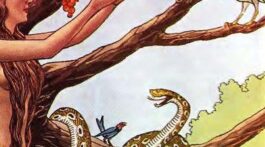Sabbath School Lesson for November 9-15, 2024
Overview and Introduction of Lesson 7, Blessed Are Those Who Believe
Memory Text: “Jesus said to him, ‘Thomas, because you have seen Me, you have believed. Blessed are those who have not seen and yet have believed.’ “ John 20:29 NKJV
John presents a diverse group of people in his Gospel, who testified in various ways their belief in who Jesus was. The Son of God knew each of these individuals in a way only God could know them.
Jesus patiently worked with them as they allowed Him into their lives. It was His desire for all to see Him as the way to find salvation, divine truth, and eternal life. These testimonies go all the way back to Abraham, who rejoiced in the future Messiah, and all the way forward to believers after Christ, who also rejoice for what He did to save them.
Our faith doesn’t necessarily require firsthand witnessing of miraculous signs and wonders. An abundance of people who have seen, believed, and been transformed in a major way, plus our own personal experience of God’s goodness, and the prophecies that have been fulfilled, all work together to give us enough to believe and grow our faith.
The witnesses we will examine this week are:
- Sunday: Harking Back to Abraham–Abraham had a testimony of rejoicing.
- Monday: The Witness of Mary–Mary had a testimony of giving.
- Tuesday: The Unwitting Witness of Pilate–Pilate had a testimony of recognizing innocence.
- Wednesday: The Witness of Thomas–Thomas had a testimony of overcoming doubt.
- Thursday: Our Witness of Jesus–We have a testimony of seeing prophecies fulfilled.
Sunday: Harking Back to Abraham
Carrying the wood for Abraham up the mountain for the sacrifice (just as Jesus had carried His own cross), and willingly allowing himself to be placed on the altar, made Isaac a type of Jesus–just as Abraham was a type of God the Father.
Abraham was not only the father of the Jewish nation. His profound faith has inspired us to think of him as the father of the faithful. Fixing his eyes on the Redeemer to come, who God had promised would be born through his lineage, Abraham gladly rejoiced and looked forward to the day when God’s promise would be fulfilled (John 8:56).
Jesus reminded the Jews of this when they questioned His identity. Then when they questioned how, being so young, He knew about Abraham, He told them clearly, “before Abraham was, I AM” (John 8:58), a blasphemous claim that almost got Him stoned.
Bible Verses:
Genesis 12:3, 26:4, Matthew 1:1, and Hebrews 11:17
- What made Abraham’s faith so strong?
- How can we have more faith like that of Abraham?
John 8:56-59 and Micah 5:2
- Why was this I AM statement clearly too much for the Jews listening that day?
- How and why did Jesus find a way to escape their punishment?
Monday: The Witness of Mary
We aren’t sure if Mary realized the full mission of Jesus, but her heart was so full of appreciation for Him forgiving her sins and resurrecting her brother, that she felt compelled to anoint His feet with the fragrant perfume she had been saving for His burial. It seemed possible that Jesus might soon be anointed King and she wanted to be the first to honor Him by this simple gesture.
When the fragrance spread to every corner of the house they were visiting, some of the disciples, including Judas, chastised her for such a waste of money that could have been given to the poor. Jesus understood what was on her heart, however, and commended her act, reminding them that the poor would always be with them, but His earthly presence was temporary (John 12:7-8).
The Gospel of John has a recurring theme of how Jesus knew what people were thinking and feeling. He understood Mary’s heart when she anointed Him, and He also understood the heart of Judas–that he was a thief and was stealing from the disciples’ money box (John 12:6).
Mary’s anointing Jesus has been a testimony to all believers, inspiring people, out of appreciation, to donate largely and gladly to further God’s mission of saving the world.
Bible Verses:
John 12:1-8
- How has Mary’s testimony affected those who have heard this story?
- How can we show appreciation for what God has done for us?
Tuesday: The Unwitting Witness of Pilate
Twice Jesus was brought before Pilate after His arrest in Gethsemane. Pilate, the Roman governor, noted the humble, quiet demeanor of Jesus. He had also seen the jealousy and vindictiveness of his Jewish counterparts. He must have known they were capable of petty grievances against each other, such as the ones they were bringing to Him about Jesus.
Three times, John’s Gospel mentioned Pilate declaring the innocent character of Jesus, that no fault was found in Him (John 18:38, 19:4, 6).
Bowing to public pressure and no doubt fearful of the angry mob crying for His crucifixion, however, Pilate, at last succumbed to their demands. As another effort to declare the innocence of Jesus, Pilate had them put an inscription on the cross that said He was “Jesus of Nazareth, King of the Jews”–something that further angered the Jewish leaders (John 19:19). Such an inscription indicated to everyone that Jesus was everything He said He was…and more.
This pagan Roman governor unwittingly gave witness to the sinless, noble character of the Son of God. His attempts to find truth encourages us to find it ourselves.
Bible Verses:
John 18:35-38
- Why was Pilate trying to find answers from Jesus?
- In what way was Jesus giving the governor what he needed to hear?
John 19:4, 6, Isaiah 6:3, and Revelation 4:8
- What might be symbolic about this three-time declaration from Pilate? Where have we heard His praises before, and when will we hear it again?
- What does it mean to be holy?
John 19:19
- Why was important for this sign to be above Jesus on the cross?
- What does it tell us about Jesus and the governor who put it there?
Wednesday: The Witness of Thomas
The resurrection of Christ was not an event Thomas had anticipated would advance God’s kingdom. He may have also felt offended that he was left out when Jesus revealed Himself to the other disciples. These things led to him being a shaky, doubting disciple at first.
Thomas adamantly refused to believe their claims that Jesus had risen and was alive. And, unless he could see and feel the print of the nails in Jesus’ hands and touch the wound in His side, he would not believe their report.
Eight days later, Jesus appeared again to the disciples. The doors were shut–they were obviously still afraid of the Jews–but John tells us that Jesus appeared in the midst of them. His first words, after wishing them peace, were to Thomas, the doubting one. Jesus tenderly offered to let Thomas touch His wounded hands and side, encouraging him to believe that He was alive. Thomas did not need the proof he previously thought was necessary. Instead, he quickly addressed Jesus as his Lord and God.
This story establishes the idea that faith does need evidence, but not necessarily demonstration. Through the Bible, nature, and personal experience, we are given plenty of evidence for our faith.
Bible Verses:
John 20:19-23, Ezekiel 37:5, and Luke 11:4
- Why did Jesus give the disciples the Holy Spirit, and why was His breath mentioned?
- In what way were they able to forgive sin?
- Why do we need His power to forgive others who sin against us?
John 20:24-29
- How strong was Thomas’ faith after seeing Jesus himself?
- What difference is there in our testimony after we have had a personal encounter with Christ?
- Where can we get the evidence we need to proclaim who Christ is and what He does for us?
Thursday: Our Witness of Jesus
Many of us have thought how wonderful it would have been to see Jesus performing miracles during His earthly ministry. Surely, we would have gladly accepted that He was the Messiah, the only-begotten Son of God, if we had witnessed such wonders.
But, to be honest, we today have even more reasons to believe in Jesus than the multitudes, or the disciples. Most of us have the complete Scriptures available to us. Some, even at the tip of our fingers literally, if we have a digital version. In addition, we have numerous prophecies that have been fulfilled since the time of Christ.
The fact that Christians are in such large numbers worldwide must tell us that there is something special about their message. And, let’s not forget that God’s mighty creation still speaks of our Creator. After all these centuries of our mismanagement of the environment, we still find places of solace and beauty in nature that speak of His love for this earth.
Bible Verses:
John 20:30-31
- What are some of the things that have bolstered your faith in God?
Friday: Final Thoughts
As we look at the faith of Abraham and Thomas, we must admit there was a contrast between the two at the beginning of their faith journeys. Abraham believed enough to leave his home country and go to an unknown destination. That took an enormous amount of faith. He believed in something he could not see. Thomas, on the other hand, needed tangible proof first. Unless he could see and feel, he would not believe.
Then, there was Mary and Pilate. Mary’s faith and appreciation for the Lord prompted her to give an expensive gift to Jesus. Pilate had an opportunity to give Jesus a precious gift too. But his faith was not great enough to overcome his fears, and Jesus ended up dying at Calvary.
All these stories have the purpose of showing us what our faith journey can look like–what our testimony can be. We’d, of course, like to have the devoted faith of Abraham and Mary, but often find ourselves more like Thomas and Pilate. The thing to notice, though, is that Jesus worked earnestly to get each of them to believe. He does not give up on us, but is patient, even when we have doubts and fears (2 Peter 3:9).
Next Week: Fulfilling Old Testament Prophecies
To read the Sabbath School Lesson Quarterly and see more resources for its study, go to










